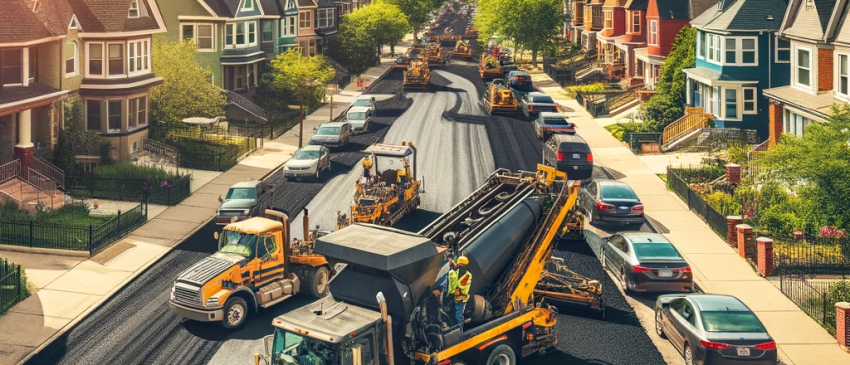Introduction
Asphalt, a staple in road construction for decades, continues to play a pivotal role in modern infrastructure. Reinforced asphalt, in particular, brings enhanced durability and longevity to traditional applications. This blog delves into the various traditional uses of reinforced asphalt, underscoring its significance in our daily lives.
Get a free quote today by calling us at (630) 592-0773.
The Backbone of Roadways
- Highways and Expressways: The most common use of reinforced asphalt is in the construction of highways and expressways. Its ability to withstand heavy traffic and a range of weather conditions makes it an ideal choice for these major transportation routes.
- Local Roads: In urban and suburban areas, reinforced asphalt is the go-to material for road construction. Its flexibility and resistance to cracking under the stress of frequent start-stop traffic is a key benefit.
Airports and Runways
Airports globally rely on reinforced asphalt for runway construction. Its strength and resilience are critical in supporting the immense weight and repeated impact of aircraft landings and takeoffs. Reinforced asphalt’s smooth surface also ensures a safer and more efficient operation of aircraft.
Parking Lots and Driveways
The use of reinforced asphalt extends to parking lots and driveways, providing a cost-effective and durable paving solution. Its ability to resist wear and tear from vehicles, as well as its ease of maintenance, makes it a popular choice for both commercial and residential properties.
Bridges and Overpasses
Reinforced asphalt plays a crucial role in bridge and overpass construction. Its capacity to handle heavy loads and resist environmental factors like moisture and temperature fluctuations ensures the longevity and safety of these vital structures.
Benefits of Reinforced Asphalt
- Durability: Reinforced asphalt is known for its exceptional durability, effectively handling heavy and continuous traffic.
- Cost-Effectiveness: Compared to some other materials, asphalt is relatively affordable and offers a good return on investment due to its long lifespan.
- Safety: The smooth surface of asphalt enhances driving comfort and reduces the risk of accidents.
- Noise Reduction: Asphalt significantly lowers the noise levels associated with traffic, contributing to a more pleasant environment.
Environmental Sustainability
A noteworthy aspect of reinforced asphalt is its compatibility with sustainable practices. Asphalt is highly recyclable, and the use of recycled materials in asphalt mixtures is a growing trend, reducing environmental impact and promoting resource efficiency.
Conclusion
Reinforced asphalt’s traditional uses, from highways to runways, illustrate its irreplaceable role in infrastructure. Its advantages, such as durability, cost-effectiveness, and environmental friendliness, ensure its continued prominence in the construction industry. As we embrace innovative technologies and sustainable practices, the future of reinforced asphalt looks promising, poised to meet the evolving demands of modern society.
Get a free quote today by calling us at (630) 592-0773.


No Comments
Be the first to start a conversation